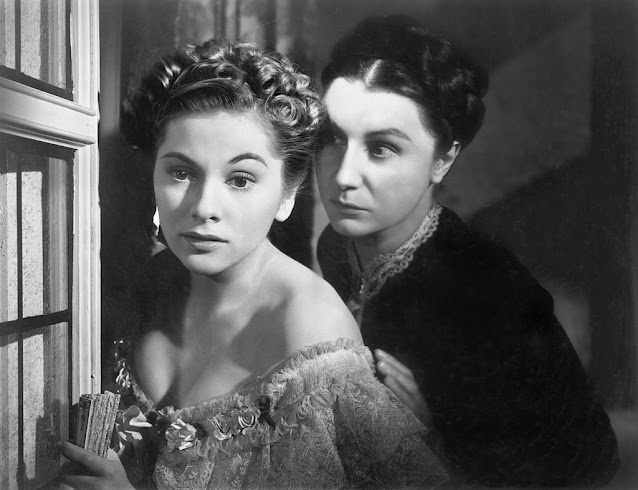Rebecca
1940's REBECCA is about three quarters of a brilliantly modulated psychological study. An elegantly tense and discomforting tale of loss, and maybe even love. Happiness seems to be an afterthought among these characters in this narrative based on Daphne du Maurier's novel. Alfred Hitchcock directs his first American picture, a Gothic romance that could be accurately called a ghost story, though the ghost is never explicitedly seen, only constantly spoken of. Her name shares the film's title, and by all accounts she was a beguiling, larger than life sort of woman. Far from a mere obedient housewife, the sort a stuffy blue blood like Maximilian de Winter (Laurence Olivier) might fancy. The widower does find one in a meek and unpolished young lady who is tellingly never identified by a first or last name.
The lady, played by Joan Fontaine, is wooed into marriage before she knows what happens. Soon she is in de Winter's impossibly large mansion known as Manderley. As it is a city unto itself. An army of servants is there to greet her. The main housekeeper, Mrs. Danvers (Judith Anderson) is among them and barely hides her contempt for the new bride at every turn, forever going on about the deceased first Mrs. de Winter, what a sophisticate she was. Through a good deal of the movie, she appears out of nowhere several times to taunt the poor girl. Their scenes are the finest in REBECCA, culminating with Danvers' showcasing of Rebecca's old bedroom. The uncertainty of the heroine's relations with her husband and some of the staff are also richly fascinating. Shadows, real and figurative, loom forbodingly. But then, after some sort of dramatic high point, we see fireworks in the sky.
I might argue that REBECCA goes a bit south from that point on, becoming more of a crime drama. This was disappointing. One can't blame the adaptation, as it follows the source closely. To me, the tale would've been far more interesting if the gradually simmering battle between Danvers and her, can I say, "opponent", had traveled to some undoubtedly grim end. Instead, intrigue of murder and possible suicide in the final third relegate the story to pulp fiction. Danvers' final scene is also quite a letdown, especially for such a carefully crafted character. Maybe that's OK, as with closer inspection you might say that this movie is just another melodrama, albeit in expensive clothes.
Hitch's direction is assured and nimble, even if this is not his usual sort of picture. George Barnes' cinematography is gorgeous (as is the Criterion transfer). The actors are all marvelous, including George Sanders in a lip smacking turn as Rebecca's "favorite cousin". The film won Best Picture, somewhat deservedly. I agree with its classic status but would've preferred to see this story conclude in a less splashy manner.
"You've become overwrought!" Mrs. Danvers says to the weary, defeated young woman right before those fireworks. She may well have foretold the remainder of the movie.



Comments